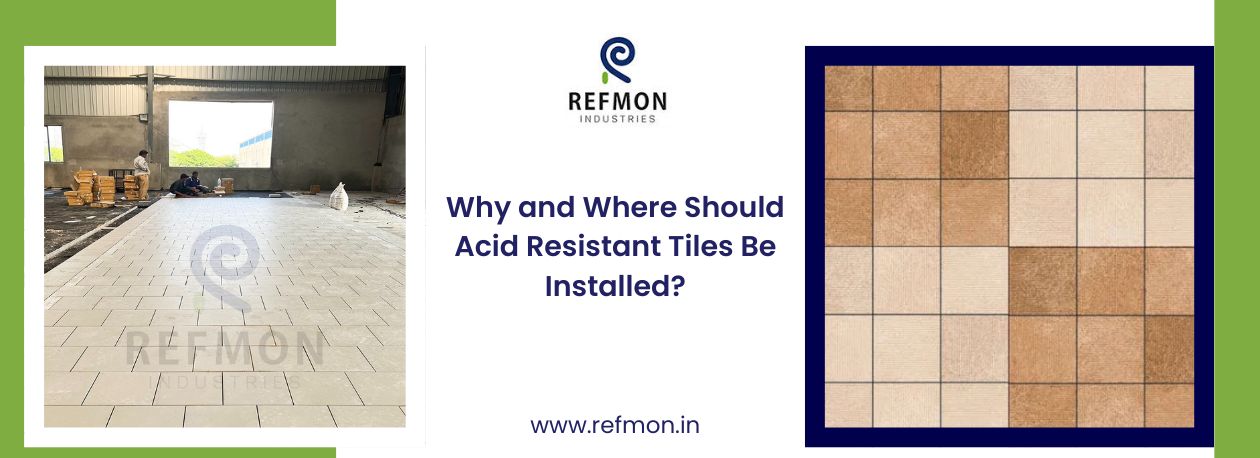
Why and Where Should Acid Resistant Tiles Be Installed?
Whenever an environment is getting too much exposed to harsh chemicals or corrosive substances or is being cleaned regularly, acid resistant tiles are important for flooring. Their high resistance to chemicals makes them a perfect choice for companies that regularly deal with chemicals. Due to new flooring innovations, using acid-proof products makes work areas safer and more hygienic. Using these tiles in certain areas reduces costly problems, keeps the area safe, and helps the company obey regulations.
Why Should Acid Resistant Tiles Be Installed?
1.Superior Chemical Resistance:
These tiles have the ability to withstand the strong effects of different chemicals, such as sulfuric acid, hydrochloric acid, nitric acid, and strong alkalis. When chemicals are often spilled in an industry, regular tiles can soon start getting corroded or discolored. These products make sure the floor doesn’t get stained and stays useful for many years.
2.Unmatched Durability and Strength
They are prepared with good quality silica, feldspar, and kaolin and are then fired at high heat to get a tough and non-absorbent surface. Therefore, ceramics are strong against mechanical forces and also withstand friction, impact, and shocks caused by changes in temperature. Facilities that work round-the-clock benefit from acid resistant tiles since these tiles endure all kinds of heavy traffic and rough conditions.
3.Enhanced Workplace Safety
If corrosive liquids are not properly handled, they can wear away flooring and make some parts of the workplace unsafe. Most of these tiles are slip-resistant and hold their form no matter how many chemicals they are exposed to because of this, workers and technicians are safer since the risk of falling is lessened.
4.Low Maintenance and Cost-Effectiveness
Once installed, acid proof flooring products means you won’t need to maintain them often. Because powder coating will not be harmed by chemicals, the parts rarely need to be covered again or repaired. You don’t have to work hard to maintain tiles, as they will last and look great over the years.
5.Regulatory and Industrial Compliance
There are stringent rules for the protection and hygiene of floors in the pharmaceutical, food processing, and chemical manufacturing sectors. Because of these tiles, employees and the environment are protected, allowing companies to comply with rules, escape lawsuits, and continue their business without problems.
Where and When Should Acid Resistant Tiles Be Installed?
1.Chemical Plants and Research Laboratories
Such facilities are always under the threat of hazardous chemicals, fumes, and liquids. Floors are the ones that usually demonstrate the first corrosion and damage. Having tiles that are acid-resistant prevents any reaction to chemical spills in R&D facilities, laboratories, and places where chemicals are used.
2.Pharmaceutical Manufacturing Units
Pharmaceutical areas should be totally clean, and chemical treatments should not ruin their materials. Since they are not porous, resistant to strong cleaning products, and tidy to maintain, acid-proof flooring is the optimal choice. Their process helps to produce medication safely in a clean, suitable environment.
3.Food and Beverage Processing Facilities
During food productions, workers often use acids or bases. They use these for cleaning. Products that have juice, oil, or vinegar can cause damage to ordinary floors. There is less risk of cleaning and replacing tiles in pickling units, breweries, dairies, and meat processing zones when using tiles that are resistant to acids.
4.Battery Manufacturing and Electroplating Workshops
These industries work with substances that are very corrosive like sulfuric acid, lead compounds, and electrolytes. It is necessary to install acid proof flooring products for safety reasons. The use of these tiles stops material damage, shields employees from dangers, and encourages seamless and regulations-friendly work practices.
5.Effluent Treatment Plants and Drainage Zones
Many times, the wastewater produced by industries includes high amounts of acids and toxic substances. All the treatment plants, neutralization tanks, and effluent areas must have flooring that will not rust. Thanks to acid resistant flooring materials, the environment is protected and the plant can continue its operations for a longer time, meeting all the necessary regulations.
Conclusion
When there are chemical dangers, acid resistant tiles provide a strong way to protect the surroundings. The use of acid-proof flooring in these places ensures that businesses get durability and safety and save costs. Since they do not rust easily, require little care, and obey industry guidelines, they prove to be a wise choice for areas where chemicals are used. Choose wisely. Install without any doubt.